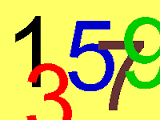Odd man out

What is the sum of the first two positive odd integers such that the arithmetic derivative of is non-zero?
For example, the third arithmetic derivative of , is given by .
Clarification: The arithmetic derivative of is given by:
- for = 1 or 0.
- = 1 if is prime.
- where and are factors of .
Note: If has multiple factors you can choose any pair to get the arithmetic derivative.
(Image courtesy of "Top Lead Generators")
The answer is 42.
This section requires Javascript.
You are seeing this because something didn't load right. We suggest you, (a) try
refreshing the page, (b) enabling javascript if it is disabled on your browser and,
finally, (c)
loading the
non-javascript version of this page
. We're sorry about the hassle.
The first two odd integers, n , with nonzero n th arithmetic derivatives are 15 (since it has prime factors that add up to a number divisible by 4) and 27 since 2 7 ′ = 2 7 so 2 7 ′ ′ ′ ′ ′ ′ ′ ′ ′ ′ ′ ′ ′ ′ ′ ′ ′ ′ ′ ′ ′ ′ ′ ′ ′ ′ ′ = 2 7 . So the sum is 42.